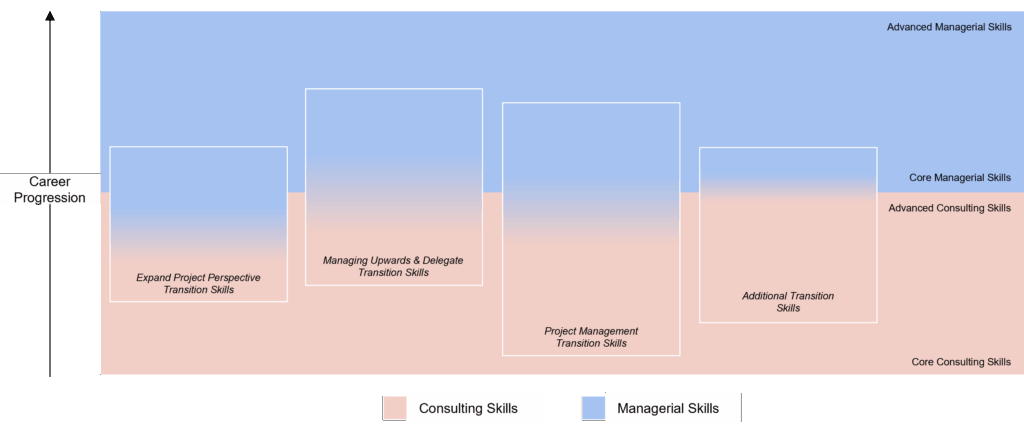
Day turns into night, and the hustle continues
In consulting, career progression usually follows analysts, consultant, manager, director, partner – with people skills increasing and technical skills decreasing as you move up in experience and seniority.

Balance of technical and people skills through career progression
Keeping this in mind, there are specialized career paths in consulting like product owners, project managers, and subject matter experts that require a different blend of technical and management skills.
As is typical in consulting, showing competencies in the grade above is a prerequisite for mastery and promotion up the corporate ladder. The juncture between consultant and manager presents the first change in function in a consultant’s career – from execution to management.
Learning to transition
Here are three transition skills I’m currently focusing on as I continue upskilling my competencies as an emerging manager:
1. Zoom out to expand your project perspective
Although project objectives and stakeholder needs are set on a holistic level, the immediate focus changes when transitioning from a consultant to an emerging manager. Formulating an appropriate approach to identify relevant insights and strategy for decision-making supports this change in perspective (consultant to emerging manager).
Here are a few skills to practice:
- Understand key stakeholder priorities, aligning on how to balance any deviations from project objectives
- Transition from solving isolated problems to considering the broader project impact, such as long-term feasibility of solutions
2. Effectively manage upwards and delegate
Emerging managers will quickly learn that strong delegation skills are important to empower your direct reports/team without micromanaging or limiting their ownership. Additionally, managing upwards ensures the right support is available for problem solving and project agility. These considerations apply to both internal (consulting firm) and external (client) stakeholders.
Here are a few skills to practice:
- Understand project objectives and support senior leadership in managing out-of-scope and ad hoc requests
- Proactively communicate project requirements (deliverables, timelines, resourcing) to your team and leadership, fostering ownership through involvement
- Use brainstorming and collaboration sessions to improve project quality and agility
3. Improve project management practices
Project management practices are crucial for success when transitioning from a consultant to an emerging manager with new managerial responsibilities. A consultant will then use (1) an expanded project perspective, (2) effective delegation and upward management and (3) relevant project management tools to prioritise and manage the daily push and pull interactions across workstreams and projects – for example, balancing project delivery with team collaboration and growth opportunities.
Additionally, proactive project management creates visibility on project progress and team utilisation which instills confidence in the senior stakeholders responsible for the project.
Here are a few skills to practice:
- Collaborate and own project planning, giving inputs on deliverables, timelines and resourcing
- Adopt project management tools such as agile ways of working, gantt charts, Microsoft Project, Trello, etc to proactively manage deliverables, timelines and resources

Transition skills across career progression
Keep your core consulting skills sharp
As a consultant stepping into managerial roles, you’ll need to keep your technical abilities sharp. As this is an initial transition to management, your technical abilities are still expected to be strong in order to support your team’s technical development. One additional consideration to keep in mind is:
4. Continuously improve your fundamental consulting skills
It’s important for emerging managers to retain and refine their core consulting skills. This enables them to leverage their consulting background and skills to drive problem-solving and leadership activities/qualities within their teams, as well as inspire those around them to prioritise continuous development
Here are a few skills to practice:
- Continuously educate yourself on industry and consulting trends to remain an effective and relevant consultant
- Identify and practice new development courses to strengthen existing competencies and development areas
- Identify and practice new transition skills that will make you a better emerging manager, in a similar format to the initial three transition skills aforementioned
With practice and dedication of the four skills, you can learn a multitude of core consulting and managerial skills that will empower you to effectively manage the people and projects around you, long before the managerial title comes along.
In the long run, irrespective of your target grade or skills development plan, continuously using the transition skills approach will quickly and easily identify the focus skills you need to accelerate and differentiate your career.
Keep tuning in to The Consulting Diaries on Championship Mode Collective to learn how to build a dream consulting career. Stay in Championship Mode. Follow Championship Mode Collective on YouTube and Instagram to help grow the reach of this blog.
The views in this article are solely the author’s. All accompanying material is owned by the author except where referenced to another source




